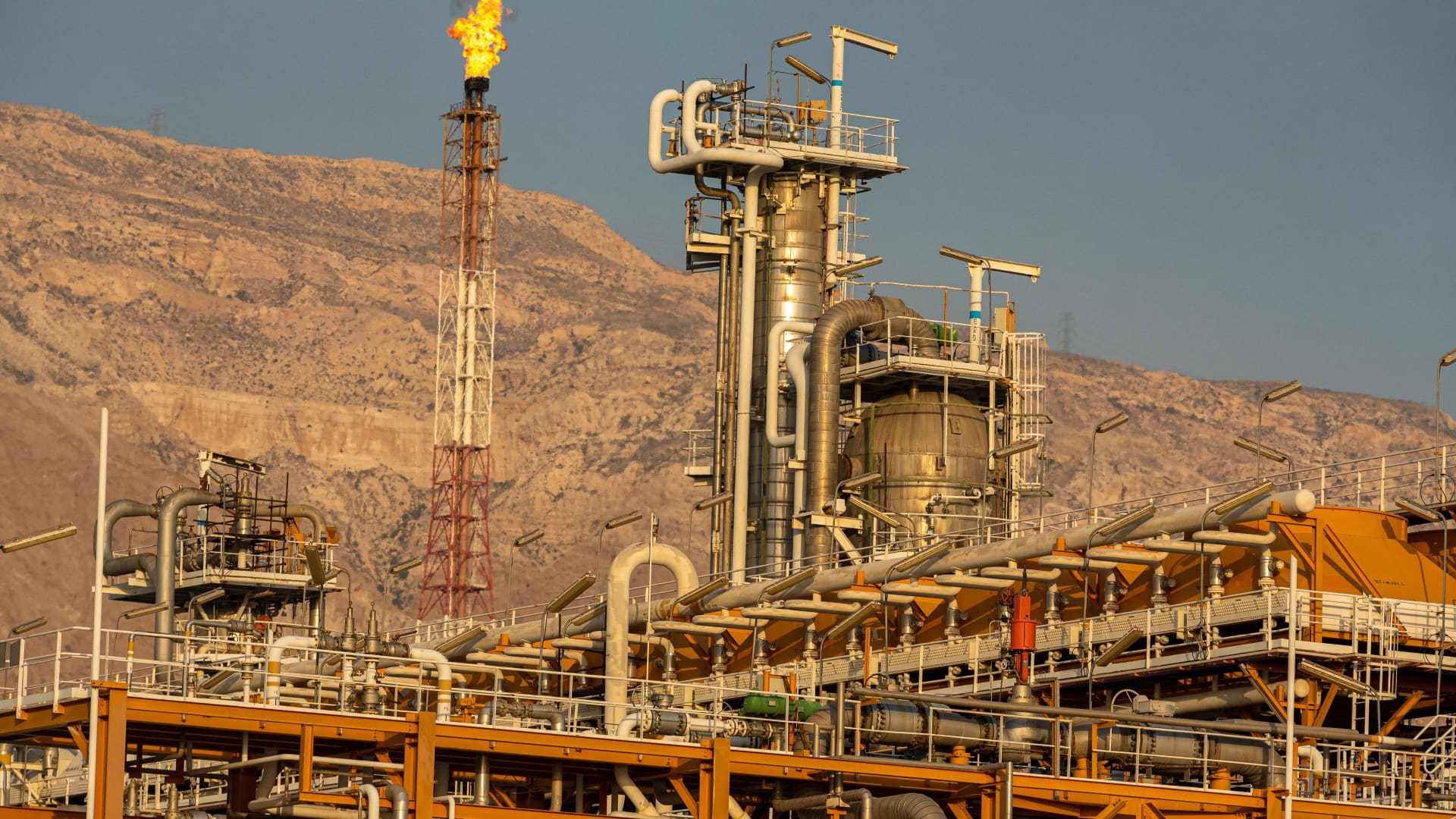
A refinery in the northern Persian Gulf in Iran.
Said Arabzadeh | Afp | Getty Images
Oil prices could rise to $100 a barrel and beyond, market watchers said, after Iran launched an air attack on Israel, reigniting fears of a regional war.
Iran is home to vast oil resources and is the third largest producer in the OPEC oil cartel. Any disruption to its ability to supply global markets could push up oil prices, analysts told CNBC. Markets will also closely monitor developments or closure of the Strait of Hormuz, a key chokepoint between Iran and Oman and through which a fifth of global oil production passes daily.
“Any attack on oil production or export facilities in Iran would raise the price of Brent crude oil to $100, and closing the Strait of Hormuz would cause prices to rise to between $120 and $130,” said Andy Lipow, president of Lipow Oil. Associates.
Iran fired more than 300 drones and missiles at Israel on Saturday evening, marking the first time Iran has launched a direct military attack against the Jewish state. A “vast majority” of Iranian drones and missiles were intercepted, according to Israel Defense Forces spokesman Rear Admiral Daniel Hagari. He said a 10-year-old girl had been “seriously injured by shrapnel”, but that there were no other victims.
Insufficient investment makes supply more fragile and increases the risk of a super spike well above $100 if supply is disrupted.
Josh Young
portfolio manager at Bison Interests
The Iranian attack was in retaliation for an Israeli strike on its consulate in Damascus, Syria, earlier this month. Iran has accused Israel of bombing part of its embassy compound on April 1, killing seven Iranian soldiers, including three senior commanders.
The Iranian United Nations mission said that after the air attack, “the matter can be considered over.” However, he warned that his response would be “considerably more severe” in the event of further Israeli retaliation.
Worsened by underinvestment
Oil prices fell slightly early in the morning in Asia. Global benchmark Brent crude slipped 0.31% to $90.17 a barrel on Monday, while U.S. West Texas Intermediate futures fell 0.44% to trade at 85, 28 dollars per barrel.
Compounded by years of underinvestment in oil exploration and development, recent geopolitical developments are making global crude supplies more vulnerable, said Josh Young, portfolio manager at oil and gas investment firm Bison Interests.
“Insufficient investment makes supply more fragile and increases the risk of a spike well above $100 if supply is disrupted,” he said.
Oil prices since the beginning of the year.
“I think oil prices will reach all-time highs this cycle, driven by a decade of underinvestment in exploration and development,” Young added.
Oil is facing a significant natural decline in production. The decline rate for a conventional oil well is about 15%, without any capital expenditure, according to Morgan Stanley estimates.
Oil prices have soared in recent months due to trade disruptions and delays caused by Red Sea maritime attacks by the Houthis, who claim solidarity with the Palestinian people.
Increase sanctions against Iran?
The dominant force in Middle East politics, Iran funds and supports groups opposed to Israel, such as the Palestinian militant group Hamas, Lebanon’s Hezbollah, Yemen’s Houthis and the Syrian administration of Bashar al-Assad. The ongoing conflict in Gaza has often been characterized as Proxy war between Israel and Iran.
US President Joe Biden condemned the Iranian attack on Israel, adding that Washington helped “destroy almost all incoming drones and missiles.”
“Our commitment to Israel’s security against threats from Iran and its proxies is ironclad,” Biden also said. said separately on social media platform. But he also told Israeli Prime Minister Benjamin Netanyahu that the United States would not participate in offensive operations against Iran, a senior administration official told NBC News.
If Iran further escalates hostilities, the United States and its allies would come under “renewed pressure to strengthen sanctions again,” Betashares chief economist David Bassanese wrote in a note following the attack .
Iranian oil exports have increased in recent years, with the United States “appearing to passively accept this as a way to maintain downward pressure on global oil prices”, he added.
cnbc





